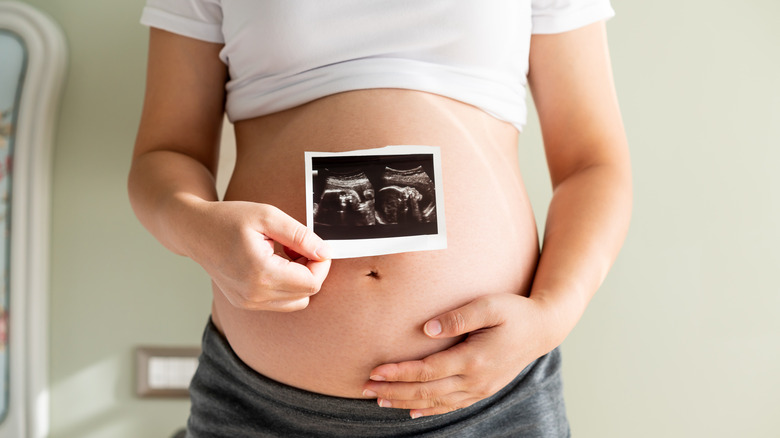What Is A Cryptic Pregnancy?
Fertility and conception are anything but one-size-fits-all. Some people conceive within a couple of months of trying, while others take years. Some couples turn to IVF treatments, and some try persistently, even in the face of miscarriage and other fertility setbacks. The road to getting pregnant can look vastly different depending on the person or couple. No matter how they got there, women discover that they're pregnant by the fifth or sixth week of gestation on average, according to a 2017 study published in the Maternal and Child Health Journal.
During these early weeks of pregnancy, common symptoms include fatigue, mood changes, breast tenderness, nausea, cramping, and food aversions (per the Mayo Clinic). MedicalNewsToday points out that some women even notice signs of pregnancy as early as five days after ovulation.
Still, others don't find out that they've conceived until much later. Nearly a quarter of women are unaware that they're pregnant until the seven-week mark or after. Of these cases, cryptic pregnancies are the most extreme.
Cryptic pregnancies are rare but crucial to detect
According to WebMD, a cryptic pregnancy is pregnancy without obvious symptoms. A woman may not realize she's pregnant until the second or third trimester — or even later. A 2011 literature review published in the Journal of the Royal Society of Medicine reported that between 1 in 475 and 1 in 516 people experience a cryptic pregnancy at 20 weeks. Around 1 in 2,500 are unaware that they're pregnant until they go into labor.
There are several reasons why a pregnancy may be cryptic. The American Pregnancy Association explains that many people get pregnant even though they believed or were told they were infertile. Therefore, they may not associate symptoms with pregnancy. A 2021 study published in BJOG: An International Journal of Obstetrics & Gynaecology pinpointed additional factors that may put some at a higher risk of having a cryptic pregnancy. These risk factors include being young, receiving less formal education, being single, and having a history of mental health conditions.
Pregnancy and delivery require medical care, and early pregnancy detection can prevent complications (per MedicalNewsToday). It's important to take a pregnancy test after a missed period and see a doctor when experiencing any new or unusual symptoms.


